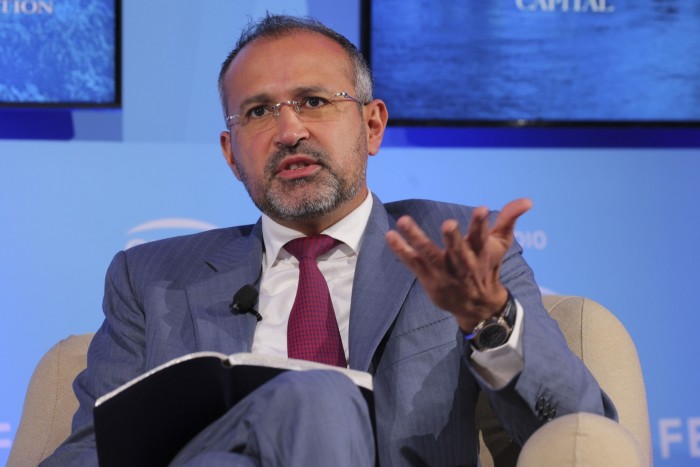As the news sank in that their jobs had suddenly vanished, staff at Britishvolt had questions.
Gathered on an emotional video meeting on Tuesday to hear of the company’s bankruptcy, most wanted to know the same thing: what went wrong?
Britishvolt’s promise to become Britain’s first big homegrown battery producer had spectacularly failed, crushing the country’s best chance of producing a domestic champion for the electric-car era.
“People felt they had been sold a bit of a dream during that time, and that they’d been lied to essentially,” said one employee who was on the call.
For months, the company, which never made any revenues, had limped between emergency funding rounds, trying to replenish a cash pile that was being devoured by its wage bill.
But on Tuesday, after a last-ditch rescue deal by a small band of shareholders was blocked by creditors, management called time on the business.
The collapse puts the UK’s most promising battery factory location — a 93 hectare site in Blyth, Northumberland — and Britishvolt’s technology, back on to the market, and dozens of potential buyers have already expressed an interest.
But whatever happens to the rump of the business, the UK now faces a big challenge to dust itself off and attract the funds to build a desperately-needed gigafactory.
“It shouldn’t have ever got to this point,” said one former Britishvolt employee. “There was already a lot of investment.”
To some, the Britishvolt project was doomed from the very beginning.
The company was founded in 2019 on the idea it could “build it and they will come”, an inversion of industry practice to secure orders before locating a factory.
The company had been seeking to develop a version of cylindrical 21700 battery cells — an existing product in the market — with better performance and charging speed.
The market was ripe: battery demand among UK car plants is expected to be 100GWh by the close of the decade. Without Britishvolt, there are only spending commitments for 27GWh, according to Benchmark Mineral Intelligence.
But the business “found it difficult navigating our way through as there’s already a lot of intellectual property in that space”, one former employee said.
Another former worker said the size of the UK car market was fatal for Britishvolt, because of limited local buyers.
Many of the carmakers with UK plants, from Nissan and Toyota to Vauxhall-owner Stellantis, have headquarters overseas and plan to source batteries from global companies that can serve several factories at once.
“These are hurdles for whoever is building the gigafactory in the UK,” they added.
As such, Britishvolt found itself in a conundrum: without working technology, it did not bank any orders from carmakers; and without orders, it could not raise the money needed to build the site.
Only Mercedes-Benz placed a “small” order for batteries last year, although on the strict condition that it remained incognito, according to two people with knowledge of the deal.
Britishvolt’s chances were not helped by its profligate spending, from providing expensive electric company cars, to sponsoring a hospitality suite at the notoriously-pricey Festival of Speed motorsport event at Goodwood in southern England.
Private jet use was also prolific — a highly undisciplined practice for a business that was by its own admission years from generating sales, never mind profits.
While much of this was reined in within the past year, the financial damage had been done.
Privately, government figures did not believe that the company would survive despite warm words and promises of support from ministers.
Even local MPs, who often praised the project on TV, raised questions about it once the cameras were switched off.
“If I was the government I wouldn’t put any money into it with the strategy, and the way they were leading the business,” said one former employee.
Within hours of its collapse on Tuesday, finger pointing had begun.
Among staff, some blamed the government. “If they’re willing to bail out bankers, why aren’t they willing to invest in something in a really economically deprived area?” asked one.
“Government ministers fell over themselves to take the credit, and so now they must also accept some accountability for its failure,” shadow business secretary Jonathan Reynolds told the House of Commons on Wednesday.
But most criticism was directed at the company’s chair Peter Rolton and acting chief executive Graham Hoare who took over following the departure of its mercurial founder Orral Nadjari last summer.
Rolton and Hoare are veterans of the energy and automotive industries, but raising money from capital markets was a new experience.
One shareholder, an experienced dealmaker who expressed interest in investing in Britishvolt, was appalled at the lack of preparation when they presented a deal.
Another described management’s ability to run the company and raise financing after Nadjari was pushed out in August as a “clusterfuck”.
Britishvolt’s final hours were governed by the chaos that had been a constant throughout the business since its inception.
Investors were growing increasingly unhappy with a lack of communication from Britishvolt’s management, which had already tightened the amount of information it provided following a spate of leaks.
“No one knows what is going on, no one knows anything,” said one shareholder on Friday last week, the day a decision had been expected on the company’s future. “It’s a shambles,” said another.
Over the weekend, in a last effort to keep the business alive, board members hammered out a deal to sell the company to a band of shareholders.
But during heated negotiations, private equity real estate group Evans Randall, a creditor, continued raising objections and “playing brinkmanship”, according to three people with direct knowledge of the talks.
At one point, Evans Randall was offered equity in the company, but requested a multimillion pound cash payment up front to accept the deal, according to three people.
“There was a viable deal. The issue was the creditors wouldn’t be reasonable with the potential new owners,” said one.
Evans Randall said the business “openly engaged” with Britishvolt and told the business it “would consider any options presented”, but that “no actual proposal was made prior to the company filing for administration”.
Others said the conflict should have been resolved much earlier, and blame the Britishvolt board for “incompetence” in mishandling the deal and leaving such crucial details until Sunday night to try and resolve.
By the end, communication within the company had almost completely broken down. Most staff learnt of the company’s impending collapse from news sites.
“[It] made me feel like we weren’t valued,” said one former employee.
Responsibility for picking up the pieces now falls to Begbies Traynor and EY.
They will attempt to oversee a rapid sales process, in part as the company’s limited cash reserves are still being used to pay the full salaries of its 26 remaining staff, most of whom are its battery experts. Bids for the Blyth site and technology are expected before the end of this month, according to two people with knowledge of the timings.
DeaLab, a little-known Indonesia-linked fund that submitted an earlier offer, is back and interested in the business, as is the shareholder trio that saw their preferred bid scuppered at the eleventh hour. The overall price of the business, once valued at more than £700mn and even last week at £32mn, is expected to be within single figure millions.
Tata, which was close to signing a deal last year for a factory in Somerset, is also among those considering the site to supply Jaguar Land Rover.
“When you look at the criteria, the golden criteria, it ticks all the real big-ticket items,” said Peter Millett, who leads construction contractor ISG, which had been slated to build the Blyth plant. ISG is owned by William Harrison, a Britishvolt investor, although Millett said he had no involvement with the business.
But the company’s failure is “going to spook a lot of people”, said one person involved in attracting foreign investment.
The collapse has also raised questions over the way the UK structures incentives.
Britishvolt’s government funding of £100mn was conditional on beginning to build its site, in part to protect taxpayer money.
Industry executives point out that other countries, such as France and Germany, pay money earlier, allowing companies to begin work faster.
“By the time they start the work, they won’t need the money,” said one industry figure.
“I do not understand the UK approach,” added another seasoned industry executive, who has worked in the UK, Germany and China.
Whether or not the company is rescued in its entirety, for Britishvolt, and many of its staff, it is the end of the line.
“They held on as long as they could,” said one person who witnessed the collapse up close, “but there are only so many times you can roll the dice.”








